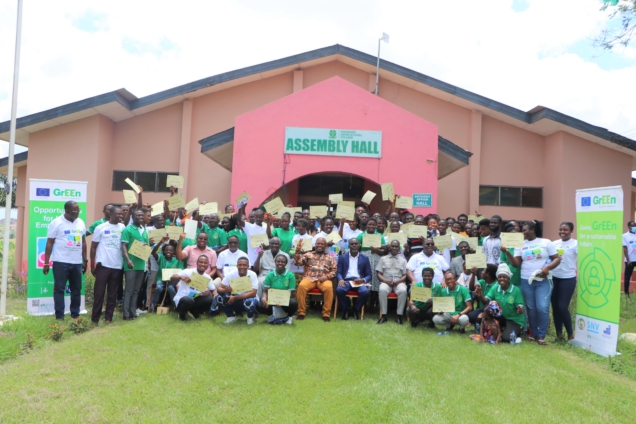The agriculture sector in Ghana is confronted with multiple challenges, including the need to ensure profitability, adapt to climate change, and promote sustainable practices.
Due to these challenges, farmers are being urged to adopt methods that are environmentally conscious to maximize returns.
Traditional agricultural practices such as bush burning, monocropping, excessive chemical usage, and lack of product value addition are notable hindrances to agricultural and environmental sustainability.
The situation is worsened due to a lack of knowledge when it comes to proper farming models.
In view of this, some 83 farmers and prospective farmers have received training from the SNV Boosting Green Employment and Enterprise Opportunities in Ghana (GrEEn) Project. This is in partnership with the Kwadaso Agricultural College
This number adds to 114 trained and certified agricultural entrepreneurs in the agriculture value chain from the Ashanti and Western Regions of Ghana who graduated from the program in February, this year.

The SNV’s Basic and Advanced Skills training under its Opportunities for Youth Employment (OYE) Programme seeks to equip beneficiaries with Climate Smart Agricultural practices.
Beneficiaries will increase their entrepreneurship and employability skills after going through courses in agro-processing, basic concepts in the value chain, crop production, financial literacy and management.
SNV Senior Skills Advisor, Awudu Darmani Musa, indicated that the key to maximum profits is to incorporate innovative methods into farming.
“Most of them are farmers or entrepreneurs who needed some theoretical background in what they are doing and also seek innovative ways of doing things. We are looking at climate change models and experiences to be put into their activities. Farmers don't know the scientific backgrounds of their practices and their effects.
"Like burning the bushes. They don't know the effects of it. So with this program, they had gone through this training and experience. Through the program, they have learned how to turn their farm produce into a useful product for them to maximize their profit,” he said.
Ejisu Municipal Director of Agriculture, Dr. David Anambam, implored agricultural practitioners and experts to take up the task of educating farmers.
“Farmers have to do their work, but the extension officer is there to assist them to improve and employ modern farming practices. Some places have one officer to 2,500 farmers. Farmers can be helped to apply experience to the theory they learn here. And that will improve their work and income. Programs like this can solve such issues.
“We should demarcate, our farmer population into the various districts. Opinion leaders who are like an extension of extension officers can teach farmers new methods. And programs where we have practitioners who teach them about their work is also better,” he said.
Principal of Kwadaso Agriculture College, Albert Appiah Amoako, revealed the school is going digital.
"…such that we now monitor produce right from production to harvesting through technology. We entreat organic farming without the use of chemicals. The sector has attracted many people. The population in Kwadaso has moved from 500 to about 921. It tells us that what we are doing here is increasing the numbers, and we need to expand our facilities now. The good news is, a lot of them are female.”

Beneficiaries of the training and financial grants of the SNV GrEEN expressed their appreciation and enlightenment.
“As a rice farmer, I only cultivate rice but, the training has enlightened me that I could start a pig farm and feed them with my rice husks. And this will generate extra income,” a beneficiary said.
Another continued that, “SNV came to our community and realized my need as a rice farmer and gave me a grant. Firstly I was working on 2 acres of land, but now working on 7 acres of and with about 10 casual workers. And I came here to gain additional knowledge to top up to expand my business,” Ahiamadzor Selasi said.
“I have been on poultry for some time now, but the animals keep dying. Today's training has taken me through practices that can maintain them and prevent losses. I have been taught how to cultivate a side business like mushroom irrespective of land size. I am very grateful that I took this opportunity,” said Hannah Akuttei
Latest Stories
-
Sad scenes from Akwatia constituency over Ernest Yaw Kumi’s death
14 minutes -
JobAgri Ghana holds stakeholder workshop to leverage evidence for decent work in Agrifood systems
21 minutes -
WAFCON 2024: Black Queens fall to defending champions South Africa in Group C opener
33 minutes -
Ablekuma North: NPP candidate goes to court to halt polling stations rerun
42 minutes -
Springfield rejects false allegations and warns against defamation
43 minutes -
Doctors can’t treat what they can’t see: why lab tests are important
51 minutes -
It hit us very hard – Nana B mourns death of Ernest Kumi
60 minutes -
Russian minister sacked by Putin found dead
1 hour -
Parliament adjourns sitting following death of Akwatia MP, Ernest Kumi
1 hour -
Bawumia mourns Akwatia MP Ernest Kumi
1 hour -
I still can’t believe Ernest Kumi’s death – Effia MP mourns
1 hour -
Minority Leader eulogises Akwatia MP Ernest Kumi
1 hour -
Speaker Bagbin’s son sweeps 7 top awards at North Hills crowned Outstanding Student of 2025
1 hour -
Former TUC Gen. Sec. Dr. Yaw Baah chairs re-constituted Board of Ghana Statistical Service
2 hours -
National Executives for the Paediatric Society of Ghana inducted into office
2 hours

